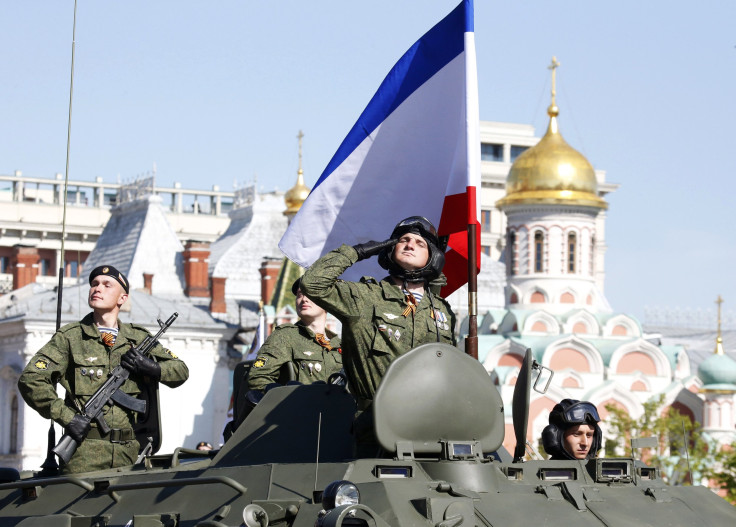Emboldened by Crimean Takeover, Russia's Army Goes On A Recruiting Spree

IVANOVO, Russia -- The Russian Army’s recruitment station was just a green camouflage tent erected in the center of this sleepy Russian city, once the capital of the Soviet textile industry, four hours’ drive from Moscow.
But it was surrounded by a throng of curious civilians, including girls in miniskirts and women with children, taking their pictures with soldiers -- and its recruiting effort was working. "We were very glad that 400 young men so far have signed up," Gen. Vladimir Shamanov, the commander in chief of Russian paratroopers, told reporters who had been summoned by the military for the recruitment event.
The goal is to bring more professionals into the Russian defense forces, which still rely largely on the draft. With plans to spend the equivalent of hundreds of billions of dollars for new weapons by 2020, the country needs more professionals in the armed forces.
The army has adopted decidedly American-style tactics to get there, including glossy leaflets and posters reminiscent of the classic “Uncle Sam Wants YOU!” One showed a Russian soldier armed to the teeth, with the caption, “Are you with us?”
Shamanov was among the officers directly responsible for the Russian military occupation of Crimea in March, which ushered in the region’s annexation from Ukraine. That role landed him on the European Union’s sanctions list. And it was the Crimean operation that put many Western observers on alert: Today’s Russian Army isn’t the ragtag collection of drunks that came out of the dissolution of the USSR. After an increase of the military budget by more than 90 percent since 2010, the army now looks and moves like a serious fighting force, and Shamanov’s men were in Ivanovo to prove it.
The show -- complete with a pop concert, T-shirt sales, and mock hand-to-hand combat with knives between paratroopers -- was the first event in a recruitment effort by Defense Minister Sergei Shoigu, Russia’s most popular politician after President Vladimir Putin. Shoigu wants to recruit almost 500,000 troops and officers by 2017, about half of the army’s current official size (the actual numbers are likely lower.)
“The army is your ticket to the future,” bellowed from the stage a veteran of the paratroopers, an elite force enjoying a status akin to the U.S. Marines.
But this was Russia, where GDP per capita is about one-fourth of the U.S. figure, and the young people who showed up wanted to talk first about money and benefits, recruitment officer Vladimir Yaltsev said.
Those who signed up for three or more years would be eligible for a bonus payment of 20,000 to 30,000 rubles ($600-$900), about a month’s average net salary in Russia, plus housing allowances, a subsidized mortgage and various other benefits, according to Defense Ministry figures.
Women, who have served in the military since Soviet times, can sign up too, although only males are subject to one-year mandatory conscription.
According to the Defense Ministry, 74 recruitment stations have been opened throughout Russia so far. Two more will open in July in the freshly annexed Crimea.
The speed and efficiency of the bloodless Russian takeover of the peninsula has given a push to the ministry’s recruitment program. Many Russian military experts noted that the well-armed soldiers seen in Crimea in crisp new uniforms were a far cry from 20 years ago, when Russian servicemen looked more like mobsters than members of a regular force. But in Crimea, the masked soldiers without national insignia -- who everybody knew were Russians -- performed with flawless discipline.
According to an April poll by the state-run VTSIOM polling agency, around 80 percent of Russians agreed that men should serve in the army. In 2002, almost the same percentage had said the opposite. Russia was then mired in its second conflict in Chechnya, which cost an estimated 6,000 Russian lives, after the first war between 1994 and 1996 had killed almost as many Russian soldiers.
The reduction of conscript service from two years to one has helped, as has a decline of the oft-deadly hazing that Russian armed forces were notorious for. The deputy head of the Military Prosecutor's Office, Maj. Gen. Alexander Nikitin, said in 2012 that the number of hazing cases had decreased 30 percent over the previous five years.
Ironically much of the improvement might be contributed not to the current defense minister, Shoigu, a man beloved by the troops, but to his predecessor Anatoly Serdyukov, a civilian bureaucrat who was widely disliked in the ranks.
Before being fired by Putin in 2012 amid a corruption probe (he was amnestied earlier this year, under the same law used to free members of the Pussy Riot punk group), Serdyukov oversaw the largest armed forces reform in modern Russian history.
"Shoigu has been leading the military for only two years, (and) many of those achievements to humanize the army began under Serdyukov," said Alexander Perendzhiev, a senior expert from the Russian Association of Military Experts.
As for the possibility that the reformed Russian Army might head uninvited into neighboring countries, as it did in Chechnya and might still do in Ukraine, a senior officer in Ivanovo was dismissive. “We don’t need another Cuban crisis,” he said, as he watched his future contract soldiers perform push-ups. “Let them deal with their own situation.”
© Copyright IBTimes 2024. All rights reserved.





















